“Even when Qamar Hayat retired in 2003 as a teacher from the Nagpur Municipal Urdu School, the Urdu class continues to be free of cost. “I don’t want to teach Urdu by taking money. I will never do that.”
By Nivedita Khandekar
Nagpur: When Dr Deepa Pendharkar, 64, joined the Urdu class this summer, the most common question she faced was: “Why does she want to learn at this age?” A medical practitioner, who has now turned to learning Urdu language which she “wanted to learn for quite some time but got the opportunity only now” became used to such questions.
Still, one question stumped her. It was, “Are you going to Pakistan?”
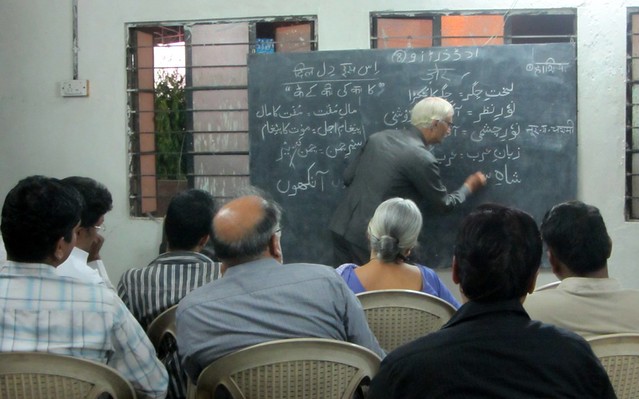
Qamar Hayat in his free Urdu teaching class at Nagpur
The myth that ‘Urdu is associated with Pakistan’was busted at the three-month course that Pendharkar went to attend. The ‘Free Urdu Learning Class’ run by Mohammad Qamar Hayat in not just an introductory class to learn reading and writing Urdu alphabets but also opens a virtual treasure trove of Urdu poetry, anecdotes associated with the language and in some cases, history of certain words/phrases not to mention comparisons/similarities between different languages.
Urdu aur Hindi mein farq sirf itna
Hum dekhte hai khwab, woh dekhte hai sapna
Above is the favourite couplet Hayat recites to emphasis the task laid out in front of him and how the medium itself helps him achieve his goal.
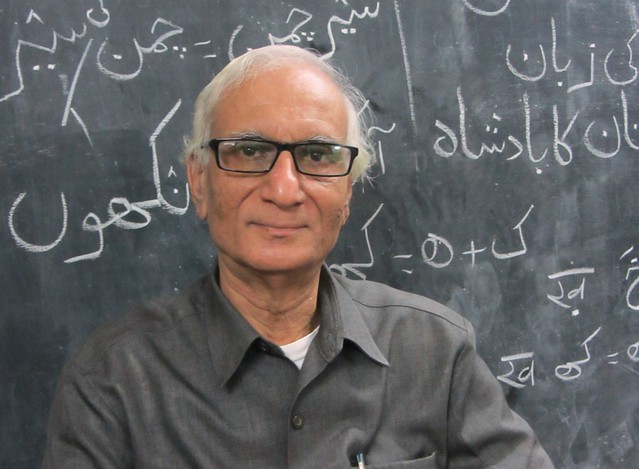
Qamar Hayat, who has been running free Urdu teaching classes at Nagpur since 1979.
“During this period, we have had sufficient introduction to Urdu language. Hayat Sir has brought us to the doorstep (of Urdu). From now on, it is for us to pursue further,” Pendharkar told TwoCircles.net about her interest in learning Urdu.
Another student at the Urdu class is Javed Sheikh, 25, who is pursuing a PG degree. Already holder of BCP, PGDCCA, MCM, M Com and law degrees, he wants to go for B A (Urdu) now. “The language is so sweet. Moreover, once you learn it, you acquire adab,” Sheikh says.
Earlier this month, their batch, the 103rd batch of the introductory ‘Free Urdu Learning Class’ concluded. The batch started with Pendharkar and Sheikh along with some 40-odd students of varied age group and from different economic profiles. Few of them trickled out by the time the class ended.
Shirish Naik, an IT professional, always wanted to learn Urdu. He has also tried his hand at calligraphy. “Urdu is difficult I think, but Hayat Sir made it so easy to understand,” Naik, who has recently prepared the FaceBook page for Hayat, says.
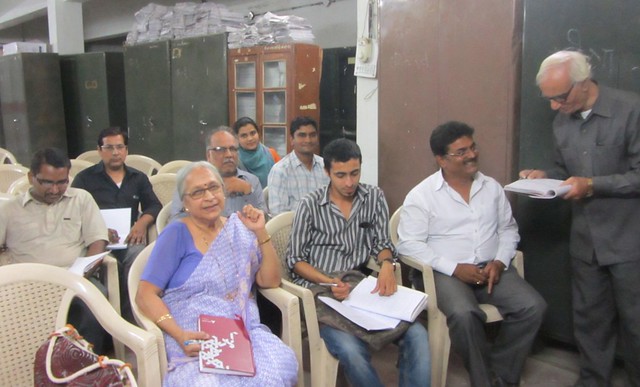 Qamar Hayat makes it a point to solve all personal problems of his students at the free Urdu teaching class at Nagpur
Qamar Hayat makes it a point to solve all personal problems of his students at the free Urdu teaching class at NagpurAshok Kadu, 61, retired from DAGPT office after which he thought of pursuing his passion. A lover of old Hindi film songs, Kadu says he had already learnt Arabic, which he had found very hard. “But after learning Urdu here, now I find Arabic very easy,” he says.
Raja Dhau Balkhande, a lecturer in a government college, says his inspiration to learn Urdu is Shrikant Thackeray, the famous Bollywood mausikar. “He (Thackeray) learnt Urdu right from alif bey pey from a waiter. I have also heard of former Prime Minister PV Narasimha Rao knowing 14 languages. I plan to do a comparative study on Sahir Ludhiyaanvi and Kaifi Azmi,” he says with excitement.
Naresh Gidwani runs a bakery in Shanti Nagar, a Muslim dominated neighbourhood. He had earlier travelled and lived in Latin America and Africa, where he learnt those respective languages. He was fascinated by the nuances in Urdu and moreover thought learning the language will help in his work. He got an unexpected shock when one day he went to his Muslim neighbour to ask about a certain difficulty in the home work that Hayat Sir had given. “You are so lucky you are learning this language. Once you are done, please teach me too,” his neighbour said.
Urdu classes since 1979
Run for free from the Vidarbha Sahitya Sangha premises, Hayat has been conducting the Urdu learning classes since 1979. Hayat is so dedicated towards Urdu teaching, the evening class takes priority everything else. Long time ago, when his younger son was one year old, he strolled out of the colony gate and went missing. His hassled wife was frantically searching for the son when the true, dedicated teacher asked her to continue search and himself went to teach. “Have patience. Our child will be back. But I can’t keep the 50-odd children waiting there. I am going,” he told the agitated wife. The son, of course, was found soon.
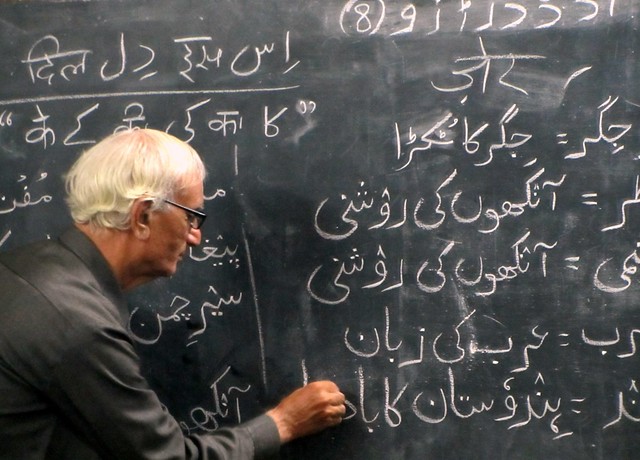 Qamar Hayat in his free Urdu teaching class at Nagpur
Qamar Hayat in his free Urdu teaching class at NagpurEven when he retired in 2003 as a teacher from the Nagpur Municipal Urdu School, the classes continue to be free of cost. “I don’t want to teach Urdu by taking money. I will never do that,” Hayat told TwoCircles.net.
Hayat is also proud of the fact that his class has people from across religions, across caste-divide and even caste hierarchy. “The government spends thousands of rupees on national integration but achieves nothing. My class has a good mix of all types of people,” he says.
Prior to 1979, whenever Hayat would recite Urdu sher-shayari, people would pester him to teach Urdu as there was no one to teach Urdu. Hayat credits famous poet (late) Mansha ur Rehman Khan ‘Mansha’ who inspired Hayat to start the classes. The first batch had 180-odd people, of which 100 completed the course.
The number has varied from time to time. But irrespective of the number, Hayat’s style has not changed. Along with teaching the alphabets, then small, simple sentences and then longer sentences, the lessons are sprinkled with couplets from films songs, qawwali, gazal, sher etc. and of course anecdotes. “Most of the students are Urdu lovers. I have to showcase (to teach them) the sweetness of the language,” the 70-year-old teacher says. Daily, he reads out a paragraph of good writing with moral value to his students.
One of the many anecdotes about Urdu and shayari that Hayat tells in the class is ‘Ghalib aur adaalat’. About 40 years ago, Advocate Nisar Ali from Nagpur’s Morris College was pleading a case when he narrated a Ghalib ka sher in front of the judge. The sher was so perfect description for the situation, the judge was impressed and immediately ruled in his favour. “See how Ghalib ka sher helped him win the case,” Hayat tells.
During his long career as a teacher in municipal school and also as a Urdu lover, Hayat has won several awards, including Maharashtra Urdu Academy’s award in 1997 for promotion of Urdu. But the best award, he says, is when his students are able to read what is written on the blackboard. “That sound is the best award ever for me. I can only say:
Alfaaz mein aati hai kaha kaifiyat-e-dil
Mahsoos jo hota hai woh bataya nahee jata
Those from the 103rd batch included, there are about 12,000 students who have attended his Urdu classes since 1979. Monday to Friday, a batch runs for three months. Hayat has designed the course himself. After each day’s class, he recites a sher and introduces the shayar of that sher to the students. Vidarbha Sahitya Sangha gives a ‘Certificate of Participation’ to each students who complete the course. Hayat has meticulously maintained registers with contact details of all those who enrolled in his classes over the four decades.
Looking back, Hayat is content, filled with satisfaction. The range of students that he has taught is amazing. It included odd students such as two female judges, who wanted to learn Urdu because they got lot of talaq cases. Famous Marathi poet (late) Suresh Bhat was his good friend and had written a long piece on Hayat in one of the Marathi magazines.
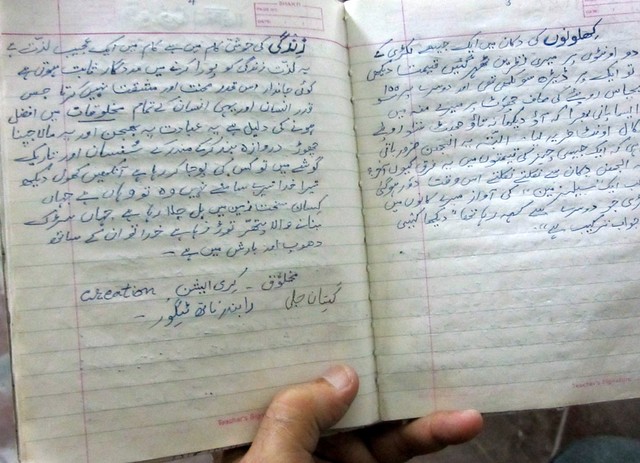 Qamar Hayat reads out a good paragraph every day from his notebook during the free Urdu coaching class at Nagpur
Qamar Hayat reads out a good paragraph every day from his notebook during the free Urdu coaching class at NagpurEven at this age, the septuagenarian drives a simple two-wheeler, dresses just as he has always since 1979, a simple safari suit and continues to teach the Urdu zubaan just he has always.
He has two sons, one a Computer Science Graduate and working with Gujarat government now; while the second son has done MS (Robotics) and now into teaching. His wife, a central government employee, is due to retire on June 30. So after almost 35 years of his stay at the government flats/quarters at Krishi Kunj in the prime locality of the city, Hayat will think of looking for a different place after few months.
“But wherever I go, my teaching will continue,” the die-hard teacher declares.
Related:

